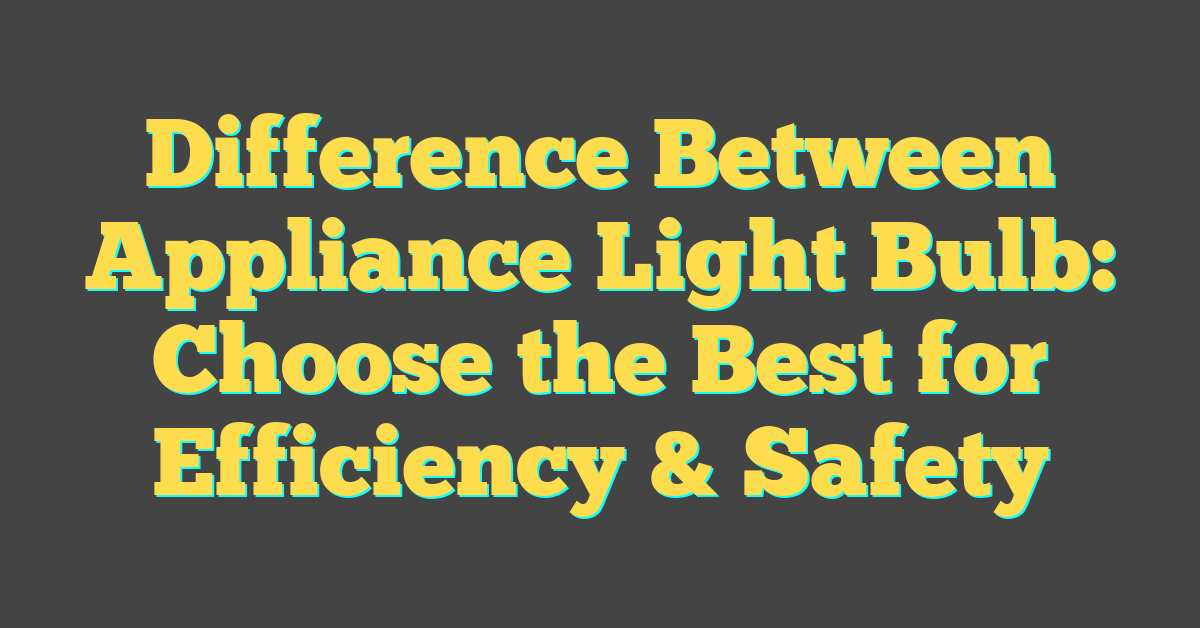Ever found yourself puzzled at the hardware store, staring at the array of light bulbs and wondering which one’s right for your fridge or oven? You’re not alone. Appliance light bulbs aren’t your standard fare, and there’s a good reason they stand apart.

Choosing the correct bulb ensures your appliances light up correctly and last longer, saving you both time and money. So let’s dive into what makes appliance light bulbs different, and why you can’t just pop any bulb into your microwave or stove.
What are Appliance Light Bulbs?
When you’re wandering through the lighting aisle, pondering over the myriad of bulbs, appliance light bulbs might just catch your eye with their distinctive build and features. They’re often smaller, tougher, and quite frankly, indispensable when it comes to getting light in the cozy corners of your household appliances. These specialty bulbs are engineered to withstand extreme temperatures and vibrations, making them robust companions for your hardworking appliances.
Designed for Resilience
Think about the conditions within your fridge or oven. It’s an environment that’s either chilly or blazing hot. Regular light bulbs aren’t designed for such extremes and would quickly falter, but appliance bulbs? They’re a whole different story. Their reinforced design includes features like stronger filaments and sturdier glass, which help them endure the routine opening and closing of doors and the occasional food-based explosion with grace.
Understanding Wattage and Size
Choosing the right light bulb is not just about fitting into the socket—it’s about matching the wattage and size to your appliance. Here are the typical wattages for appliance bulbs:
| Appliance | Typical Wattage |
|---|---|
| Fridge | 15-40 Watts |
| Oven | 25-40 Watts |
| Microwave | 20-30 Watts |
| Freezer | 15-25 Watts |
Check your appliance manual to see what size base and wattage is required, as getting it wrong could lead to inefficient lighting or, worse, damage to your appliance.
Special Features for Enhanced Performance
If you thought light bulbs were simple, think again. Some appliance bulbs come equipped with coatings or gases that enhance their performance by providing clearer, crisper light, or by reducing the heat emitted—quite the technological marvel for something so seemingly mundane. Whether it’s the cool, calming light in your fridge or the warm, welcoming glow in your oven, these bulbs ensure that you’re not left in the dark while grabbing a midnight snack or checking on your roast.
Just remember, when you’re looking to replace an appliance bulb, skip the regular bulb section. Your appliances demand bulbs that meet their unique needs, and now you know just how special appliance light bulbs can be.
Different Types of Bulbs for Appliances

When you’re rummaging through your storage drawer for a light bulb, it might be tempting to grab any bulb that fits. But hold on! Different appliances require different bulbs, and understanding this will save you time and trouble down the line.
Standard Incandescent Bulbs, once the bread and butter of household lighting, are still used in some appliances. They’re affordable and give off a cozy, warm light. However, they’re not the most energy-efficient option and may not last as long under heavy use or in high-vibration environments like your garage door opener.
Then there’s the Halogen Bulbs. A tad more efficient than their incandescent cousins, halogen bulbs offer a vibrant, white light, perfect for the keen chef wanting to keep an eye on their roast. Just remember, these bulbs can get hot, so they’re better for ovens than fridges.
For those who love to tread lightly on the earth, LED Bulbs might tickle your fancy. They’re the poster child for energy efficiency and have an impressively long lifespan. LED bulbs can be fine-tuned to give off different hues of light, making them versatile for various appliances, be it your microwave or your refrigerator.
Don’t overlook Compact Fluorescent Bulbs (CFLs), which strike a balance between longevity and energy use. They provide a bright white light without the intensity of halogens. If you’ve got an appliance that needs consistent, reliable lighting, CFLs could be your go-to.
| Type of Bulb | Energy Efficiency | Lifespan | Best Used For |
|---|---|---|---|
| Standard Incandescent | Low | Short | Cost-sensitive setups |
| Halogen | Medium | Medium | Ovens and cooktops |
| LED | High | Long | Refrigerators, microwaves, and general appliances |
| CFL | High | Long | Appliances needing bright white light |
Remember, when choosing bulbs for your appliances, check the specifications in the appliance manual. Wattage, base size, and resistance to temperature variance are crucial factors. You wouldn’t want to come home to a freezer full of melted ice cream because the bulb was too hot, would you? Choose wisely, and your appliances will thank you with optimal performance.
The Importance of Choosing the Right Bulb
« What Is the Difference Between a Light Bulb and a Resistor? Uncover Their Unique Roles
How to Light Bulbs in Crazy Drop Game: Score High with These Pro Tips »

When you dive into the world of home DIY projects, the subtle intricacies of lighting might not be the first thing on your mind, but they should be. Choosing the right bulb for your appliances is more than a matter of brightness; it’s about maximizing efficiency, safety, and longevity. Bulbs are often overlooked, yet they’re pivotal in ensuring your appliances function at their best.
Each appliance in your home demands a specific type of bulb, and it’s critical to understand the nuances. For instance, your fridge needs a bulb that’s resilient in cold temperatures and can handle frequent door openings without compromising performance. On the other hand, an oven bulb has to withstand extreme heat. Using a standard bulb here is not only inefficient but could be a safety hazard, as they’re not designed to handle such conditions.
LED bulbs have revolutionized the way we light our homes and appliances. They have an impressive lifespan that can span years, requiring fewer changes and offering a significant reduction in energy consumption. If your focus is on an eco-friendly lifestyle or reducing your electricity bill, LED bulbs are a clear choice. Plus, they come in various shapes and sizes, ensuring you can find the perfect fit for any appliance.
On the flip side, compact fluorescent bulbs offer a compromise between energy efficiency and initial cost, making them an attractive option if upfront expense is a concern. While halogen bulbs provide brilliant white light, they’re more suited to appliances without drastic temperature variances, like your microwave or range hood.
Remember the thrill of perfectly executing a home improvement task? Don’t let the wrong bulb choice dim that sense of accomplishment. Always refer to your appliance manual or consult a professional to ensure you’re making the right selection for your specific appliance needs. Consider how often the appliance is used, the environment it operates in, and what bulb qualities are most important for that application. Your appliances, and your wallet, will thank you for the extra attention to detail.
Special Features of Appliance Light Bulbs

As an avid DIY enthusiast with a soft spot for lighting, you understand that appliance light bulbs are not your ordinary illuminators. They’re the secret agents of the lighting world, designed to operate under conditions that would make regular bulbs flicker and fail.
Appliance light bulbs are built tough. Their reinforced filaments and specialized bases allow them to withstand the vibrations from appliances like refrigerators and dryers without shortening their lifespan. Imagine them as the all-terrain vehicles of lighting, ready to take on bumps and thumps with ease.
Moreover, they’ve got heat resistance in their DNA. Oven bulbs, for example, laugh in the face of extreme temperatures, continuing to shine brightly even when things get hot enough to cook your turkey. Unlike their standard counterparts, these bulbs are made with special glass that won’t crack or shatter under the heat of your culinary masterpieces.
The magic doesn’t stop there. Appliance bulbs are also adept at managing their energy use. Many are available as LEDs, ensuring that while they stand guard in your appliances, they’re not racking up the energy bills. You’ll often find that they boast impressive longevity, a feature that’s both wallet-friendly and convenient, saving you from frequent replacements.
Here’s a quick breakdown of the types of appliance bulbs you might come across:
- Oven Bulbs: High heat tolerance, typically made from tougher glass.
- Refrigerator Bulbs: Designed to endure cold temperatures and repeated door openings.
- Microwave Bulbs: Shielded to handle microwaves without interference.
- Dryer Bulbs: Vibration resistant for those high-spin cycles.
Opting for the right appliance bulb means more than just choosing one that fits. It’s about finding a bulb that meshes with the unique environment of your appliance. When you’re knee-deep in your next home DIY lighting project, keep these specialized features in mind for a seamless fusion of function and longevity.
Conclusion
You’ve got the scoop on why picking the right bulb for your appliances matters. Remember, it’s not just about illumination—it’s about making smart choices for efficiency and durability. LED bulbs are your go-to for a bright, cost-effective future, while compact fluorescents strike a balance if you’re watching your wallet. So next time you’re in the bulb aisle, think about those special features that make appliance bulbs stand out. Whether it’s for your oven, fridge, or any other appliance, you’re now equipped to make an informed decision that’ll keep your home glowing just right.
Frequently Asked Questions
What is the importance of choosing the right light bulb for an appliance?
Choosing the right light bulb ensures maximum efficiency, safety, and longevity for your appliance. The correct bulb can handle specific conditions such as extreme temperatures or frequent door openings.
Why are LED bulbs recommended for appliances?
LED bulbs are recommended for their long lifespan and energy efficiency, which makes them ideal for use in appliances that are used frequently or consume a lot of energy.
Can compact fluorescent bulbs be used in appliances?
Yes, compact fluorescent bulbs can be used in appliances as they offer a compromise between energy efficiency and cost, although they may not be as durable as LED bulbs in certain applications.
What special features do appliance light bulbs have?
Appliance light bulbs typically have reinforced filaments, specialized bases, and are designed to withstand heat, making them well-suited for the harsh environments inside certain appliances.
Are there different types of appliance bulbs for different appliances?
Yes, there are specific types of bulbs for different appliances, such as oven bulbs, refrigerator bulbs, microwave bulbs, and dryer bulbs, each designed to meet the unique requirements of each appliance.
What should be considered when choosing an appliance bulb?
When choosing an appliance bulb, consider the bulb’s features like heat resistance, durability, and whether it can handle the appliance’s specific conditions (temperature changes, moisture, etc.).




